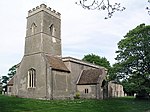The Cambridgeshire Lodes are a series of man-made waterways, believed to be Roman in origin, located in the county of Cambridgeshire, England. Bottisham, Swaffham Bulbeck, Reach, Burwell, Wicken and Monks Lodes all connect to the River Cam, while Soham Lode connects to the River Great Ouse. All have been navigable historically, but some are no longer officially navigable.
Bottisham Lode was navigated throughout the 19th century, and although the flood gates at its mouth were replaced in 2001, it carries a "No unauthorised vessels" notice. Swaffham Bulbeck Lode has been rendered unnavigable by the removal of the lower lock gates, and the replacement of the upper lock gates with a guillotine gate which provides little headroom. Reach Lode is quite deep, as a result of the surrounding land sinking, and the banks being built up. The lower gate of the entrance lock has been replaced by a guillotine gate, enabling boats up to 63 feet (19 m) long to use it.
Burwell Lode is a tributary of Reach Lode, and is another deep lode. Barges were built and maintainted at Burwell until 1936, and it was used commercially until 1963, when carriage of sugar beet ceased. Wicken Lode is another tributary of Reach Lode, and was important for the carriage of peat and sedge. It runs through Wicken Fen, one of the oldest nature reserves in England, as the National Trust bought their first part of it in 1899. Soham Lode is more recent than most, probably dating from the 1790s. It ran by Soham Mere, a large inland lake which was drained in the late 18th century.
In 2007 a strategy plan considered options for the management of the lodes which included rebuilding most of them at a lower level, but concluded that maintaining the banks at the existing level was a better long-term solution.











